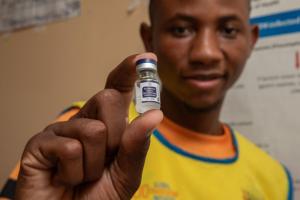Zambia launches malaria vaccine to protect over half a million children
Lusaka – The Government of the Republic of Zambia, through the Ministry of Health, today officially launched the malaria vaccine (R21/Matrix-M) as part of its Expanded Programme on Immunization (EPI), marking a historic milestone in the country’s fight against malaria. Over 500 000 children aged 6‒8 months will be vaccinated in the months following the launch.
Malaria remains one of Zambia’s leading causes of illness and death, particularly among children under five years of age. In 2023 alone, malaria incidence among this age group rose to 523 cases per 1000 population, according to the Trends of National Under-Five Malaria Cases and Incidence per 1,000 Population (Health Management Information System and Malaria Rapid Reporting System). The disease continues to contribute to high rates of anemia, poor child development, and preventable deaths.
The vaccine will be rolled out in a phased approach, targeting 83 districts initially (79 high-burden and 4 moderate-burden). The remaining five moderate-transmission districts will be reached later, in the second phase planned for 2026. The selected vaccine will be given in a four-dose schedule: dose 1 at 6 months, dose 2 at 7 months, dose 3 at 8 months, and dose 4 at 18-23 months.
“We are proud to be one of the countries rolling out the malaria vaccine nationwide. This vaccine gives us new hope as it is a powerful tool to protect our children and move closer to a malaria-free Zambia. However, let’s not forget that this vaccine comes to complement existing interventions such as insecticide-treated nets, indoor spraying, prompt diagnosis and treatment as well as prevention therapies in alignment with the National Malaria Elimination Strategic Plan and WHO recommendations,” said the Hon. Elijah Muchima, Minister of Health.
Zambia will be the 24th country to introduce the malaria vaccine. The country has already received 532,200 doses of the vaccine through UNICEF with support from Gavi, the Vaccine Alliance (Gavi).
“The introduction of the malaria vaccine in Zambia is a landmark achievement for child health,” stated Dr. Saja Farooq Abdullah, Representative, UNICEF Zambia. “By protecting about half a million children in the first phase, we are not only saving lives but also strengthening the foundation for a healthier and more resilient future. UNICEF is proud to support the Government of Zambia in this historic effort, ensuring that every child—no matter where they live—has access to life-saving vaccines and a chance to thrive.” UNICEF’s support included planning, cold chain readiness, vaccine procurement and distribution, capacity building and communication and social mobilization.
“Today marks a historic milestone in Zambia’s fight against malaria. The launch of the malaria vaccine is more than a medical intervention, it reflects our unwavering commitment to equity, innovation and saving lives. WHO remains steadfast in supporting Zambia in this transformative moment, as we move closer to a malaria-free generation,” said Dr Peter Clement Lasuba, WHO Representative to Zambia.
The initiative is led by the Ministry of Health, through EPI and the National Malaria Elimination Centre (NMEC), with coordination from a Technical Working Group comprising WHO, UNICEF, Gavi, World Bank, USAID/PMI, Global Fund, CHAZ, CIDRZ, PATH, and other partners.
“Zambia joins 23 countries, a few weeks after Ethiopia, in rolling out the malaria vaccine, a game-changer for child health and malaria control. With Gavi’s support, this momentum must continue. To protect millions more children, we urgently need sustained investment. No child should be left behind,” said Jamilya Sherova, Gavi Senior Country Manager for Zambia.
Gavi is leading the rollout of malaria vaccines, working with countries and partners such as UNICEF and WHO to fund and deliver doses. Through Gavi’s unique co-financing model, countries, such as Zambia, increasingly contribute to the cost of their immunization programmes, including malaria, as their economies grow.
The malaria vaccine rollout is one of the fastest in Gavi’s 25-year history, with 24 African countries already introducing it into routine immunization programmes in just over two years Guinea-Bissau is expected to follow by the end of the year.
The vaccine, available free of charge, will be delivered through health facilities, outreach services, and community-based approaches, ensuring no child is left behind.
Zambia is accelerating malaria elimination with the new vaccine, complementing existing measures like Insecticide-Treated Net (ITN) distribution, Indoor Residual Spraying (IRS), rapid diagnosis, and preventive care for pregnant women, alongside strengthened surveillance and community engagement.
The Ministry of Health also presented the Costed Primary Health Care (PHC) Strategy 2025–2031 and its Operational Plan (2025–2026).
